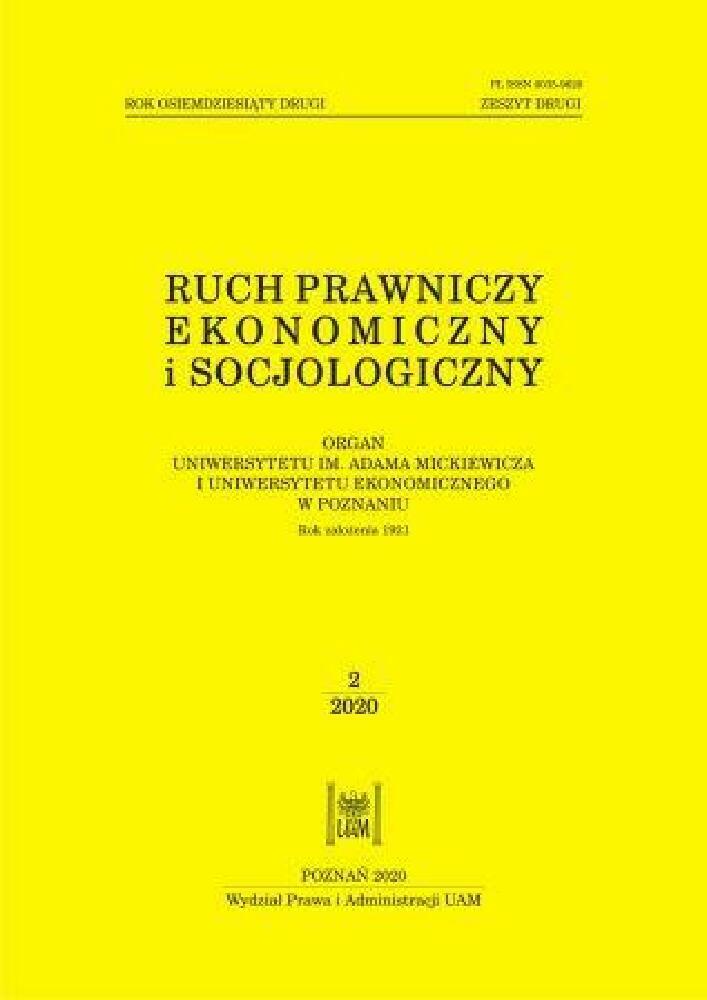Abstract
The research problem addressed in this work is the labeling of GMO-free food. The main aim of the paper is to determine the essence of food and feed labeling regarding the use of GMO. An analysis of the Polish Act of 13 June 2019 on the Labeling of Products Produced without the Use of Genetically Modified Organisms, and thus being free from such organisms, is performed in the context of the EU food law. The following research methods were applied in the course of the
research: an analysis of national and EU legislation, an analysis of the subject literature, and an analysis of secondary documents (statements, reports). Food labeling provides a basis for consumers to make informed choices and is crucial for ensuring a high level of protection of human life, health, and socio-economic interests. The unification of information on the specificity of non-GMO products in the new law makes the message transparent and clear, which may have implications
for stronger confidence among business and consumers.
References
Brookes, G., Barfoot, P. (2017). Environmental impacts of genetically modified (GM) crop use 1996–2015: Impacts on pesticide use and carbon emissions. GM Crops & Food 8(2): 117–147.
Brzóska, F. (2016). Skutki żywieniowe i zdrowotne stosowania pasz GMO w żywieniu zwierząt. Warszawa. <http://izbozpasz.pl/pluginAppObj/pluginAppObj_96_04/skutki.pdf> [dostęp: 26.11.2019].
Dabbene, F., Gay, P. (2011). Food traceability systems: performance evaluation and optimization. Computers and Electronics in Agriculture 75(1): 139–146.
Dabbene, F., Gay, P., Tortia, C. (2014). Traceability issues in food supply chain management: a review. Biosystems Engineering 120: 65–80.
Hansen, K. (2004). Does autonomy count in favor of labeling genetically modified food? Journal of Agricultural and Environmental Ethics 17(1): 67–76.
ISAA (2017). Brief 53: Global Status of Commercialized Biotech/GM Crops: 2017: Biotech Crop Adoption Leads to Greater Sustainability and Socioeconomic Opportunities for Global Farmers and Citizens. <http://www.isaaa.org/resources/publications/briefs/53/default.asp> [dostęp: 27.11.2019].
Jackson, D. (2000). Labeling products of biotechnology: toward communication and consent. Journal of Agricultural and Environmental Ethics 12(3): 319–330.
Kaphengst, T., El Benni, N., Evans, C., Finger, R., Herbert, S., Morse, S., Stupak, N. (2011). Assessment of the economic performance of GM crops worldwide. Report of the European Commission. <https://ec.europa.eu/food/sites/food/files/plant/docs/gmo_rep-stud_2011_report_econ-perf.pdf> [dostęp: 27.11.2019].
Kędzia, Z. (2018). 70 lat Powszechnej Deklaracji Praw Człowieka – pomnik czy żywy dokument? Ruch Prawniczy, Ekonomiczny i Socjologiczny 81(4): 5–23.
Korzycka, M., Wojciechowski, P. (2017a). Regulacja prawna żywności genetycznie zmodyfikowanej w USA i UE w kontekście planowanego Transatlantyckiego Porozumienia Handlowo-Inwestycyjnego (TTIP). Studia Iurdica Lublinensia 26(1): 465–488.
Korzycka, M., Wojciechowski, P. (2017b). System prawa żywnościowego. Warszawa.
Kowalczyk, S. (2015). Wzrost turbulencji na rynku globalnym a bezpieczeństwo, [w:] R. Sobiecki (red.), Przeciwdziałanie turbulencjom w gospodarce. Warszawa: 2–64.
Kowalska, A. (2019). Ekonomiczne problemy fałszowania żywności. Instrumenty przeciwdziałania. Lublin.
Kowalska, A., Kowalski, J. (2018). Administrative Liability Related to Food Fraud. A case of Poland, [w:] S. Kapounek, V. Kočiš Krůtilová (eds.), 21st Annual International Conference Enterprise and Competitive Environment. Conference proceedings. Brno: 339–350.
Kowalska, A., Soon, J.M., Manning, L. (2018). A study on adulteration in cereals and bakery products from Poland. Food Control 92: 348–356.
Kurek, A. (2009). Rolnictwo ekologiczne czy inżynieria genetyczna? [w:] E. Bojar, K. Pylak (red.), EkoLubelszczyzna XXI wieku. Podnoszenie świadomości o żywności ekologicznej mieszkańców regionu. Lublin–Toruń: 27–41.
Meulen, B.M.J. van der (2009). European Food Law Handbook. Wageningen.
Ozimek, I. (2012). Ochrona konsumentów na rynku żywności – wybrane aspekty. Konsumpcja i Rozwój 1: 61–70.
Paruzel, R. (2018). Problem innowacji – ujęcie teoretyczne. Przegląd Prawno-Ekonomiczny 2(43): 334–346.
Snell, C., Bernheim, A., Bergé, J.B., Kuntz, M., Pascal, G., Paris, A., Ricroch, A.E. (2012). Assessment of the health impact of GM plant diets in long-term and multigenerational animal feeding trials: a literature review. Food and Chemical Toxicology 50(3/4): 1134–1148.
Stępień, M. (2017). Analiza regulacji prawnych w zakresie wykorzystania GMO. Przegląd Prawa i Administracji 108(3759): 157–168.
Taczanowski, M. (2016). Definicje legalne prawa żywnościowego – przyczyny tworzenia i formy. Żywność. Nauka. Technologia. Jakość 6(103): 7–9.
Taczanowski, M. (2017). Prawo żywnościowe. Warszawa.
Wiśniewska, M.Z. (2015). Systemowe zarządzanie obroną żywności przed terroryzmem. Gdańsk.
Zapała, C. (2016). Prawne aspekty obrotu żywnością genetycznie modyfikowaną w Unii Europejskiej i Polsce. Studenckie Zeszyty Naukowe 19(30): 105–121.
Żuchowska-Grzywacz, M. (2019). Znakowanie produktów żywnościowych jako narzędzie gwarantujące prawidłową realizację konstytucyjnego prawa konsumenta do informacji. Przegląd Prawa Konstytucyjnego 49(3): 229–243.
License
Copyright (c) 2020 WPiA UAM

This work is licensed under a Creative Commons Attribution-NonCommercial-NoDerivatives 4.0 International License.





